|
|
|

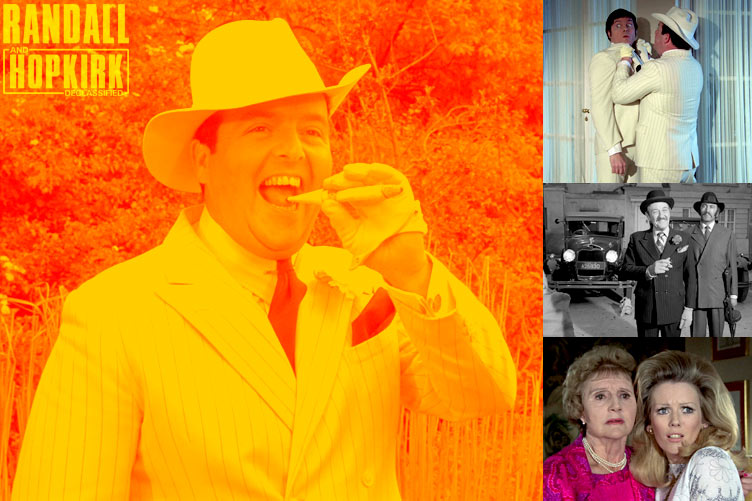
|
Images © ITV Studios, 1969 /
Composition @ Alan Hayes © 2024 |
|
Writer: Tony Williamson
Director: Jeremy Summers |
|
ORIGINAL ITC SYNOPSIS |
|
The ghost detective
meets up with a ghost gangster, and the Bonnie
and Clyde era comes up-to-date in a vendetta
between a notorious gangster and the spirit of a
rival for whose death he was responsible.
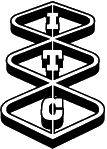
Paul Kirstner owes his
wealth to his years of racketeering in America.
Now, in England, he gets a cold reception from
his daughter Susan, who has little place in her
heart for the father who has left her alone for
years and whose background she suspects.
Nevertheless, Kirstner is worried about her
safety when he realises that she is still being
harrassed by the ghost of his late rival, Bugsy
Spanio, who has been haunting him since his
earthly demise, engineered by Kirstner backing
in the roaring Twenties.
This is why Kirstner hires
Jeff Randall to protect Susan, without realising
that Bugsy has seen an opportunity to wreak his
final revenge by using the partnership between
Jeff and the ghostly Marty Hopkirk.
Hopkirk's first inkling
that something strange is happening is when,
without realising that Bugsy is also a ghost, he
sees him with his widow Jean in her bedroom.
Convinced that Jean is having an affair, he
protests violently to Randall, telling him to do
something about it. Jean is bewildered. So is
Randall when he is unable to see Bugsy with her.
Hopkirk discovers that
Bugsy is a fellow ghost when the gangster
demands his help and says that Jean will suffer
if he doesn't co-operate. He begins to carry out
his threats when Jean and Susan are staying
together so that Randall can keep an eye on them
both, but there is an unexpected development
when a gangster named Lacey arrives on the
scene, also intent on having revenge on Paul
Kirstner.
Hopkirk finds it necessary
to draw Bugsy into an invisible fight to divert
attention and, as the furniture is flying,
Kirstner turns up and assumes the upper hand.
Preparing Lacey for the worst, he takes him out
into the garden for the moment of reckoning. But
Bugsy is already there...
|
|
|
PRODUCTION & ARCHIVE |
Production
Code:
RH/DCW/4024
Filming Dates: May-June 1969
Production Completed: Late Aug 1969
Recording Format: 35mm Colour Film
Archive Holding: 35mm Colour Film |
|
UK REGIONAL PREMIERES |
|
Anglia: Sun 25 Oct 1970, 3.00pm
ATV: Fri 21 Nov 1969, 7.30pm
Border: Fri 13 Mar 1970, 7.30pm (M)
Channel: Fri 21 Nov 1969, 7.05pm (M)
Grampian: Wed 22 Apr 1970, 8.00pm (M)
Granada: Sun 18 Jan 1970, 11.20pm
Harlech: Sun 9 Nov 1969, 3.45pm (M)
LWT: Sun 2 Nov 1969,
7.25pm (M)
Scottish:
Sat 15 Apr 1972, 9.30pm
Southern: Sun 7 Dec 1969,
7.25pm (M)
Tyne Tees: Sun 13 Sep 1970,
9.05pm
Ulster: Sun 15 Nov 1970, 3.45pm (M*)
Westward: Fri 21 Nov 1969, 7.05pm (M)
Yorkshire: Fri 21 Nov 1969, 7.30pm |
(M) =
Transmitted in Monochrome/Black and White
(M*) = Transmitted in B/W due to ITV Colour
Strike |
|
CHARACTERS & CAST |
|
Jeff
Randall
Marty Hopkirk
Jean Hopkirk
Paul Kirstner
Bugsy Spanio
Mrs. Maddox
Susan Kirstner
Jack Lacey
Harry
Hotel Porter |
Mike Pratt
Kenneth Cope
Annette Andrι
Alan Gifford
David Healy
Joyce Carey
Sue Gerrard
Raymond Adamson
Patrick Connor
Charles Lamb |
|
UNCREDITED |
|
Flashback Gangster |
Frank Maher |
|
STAND-INS |
Jeff Randall
Marty Hopkirk
Jean Hopkirk |
Harry Fielder
Dougie Lockyer
Tina Simmons |
|
BLU-RAY
RESTORATION |
|
35mm Negative /
Magnetic soundtrack |
|
EPISODE SPECIAL FEATURES |
|
Production footage
(mute, 00:19), Photo Gallery |
|
ORIGINAL SOUNDTRACK |
|
Selections from the incidental
score for this episode have been issued on Randall
and Hopkirk (Deceased): Original Soundtrack by Edwin
Astley,
Network, 2008 |
|
|
PRODUCTION CREDITS |
|
An ITC Production
Writer Tony Williamson
Series Theme / Musical Director Edwin Astley
Series Creator / Executive Story Consultant Dennis
Spooner
Creative Consultant - Cyril Frankel
Producer Monty Berman
Director Jeremy Summers |
|
Production
Supervisor Ronald Liles
Director of Photography Brian Elvin
Art Director Charles Bishop
Post Production Philip Aizlewood
Editor Lee Doig
Production Manager Malcolm Christopher
2nd Unit Director Jack Lowin
2nd Unit Cameraman Gerald Moss
Sound Recordists Denis Porter and Bill Rowe
Sound Editor Guy Ambler
Music Editor Alan Willis
Casting John Owen
Set Dresser Roger Christian
Construction Manager Bill Greene
Camera Operator Val Stewart
Assistant Director Michael Meighan
Continuity Sally Ball
Production Buyer Peter Dunlop
Make-Up Elizabeth Romanoff
Hairdresser Ramon Gow
Costume Supervisor Laura Nightingale
Scenic Artist A. J. Van Montagu
Stunt Co-ordinator Frank Maher
Sound Effects Cinesound
Titles Chambers + Partners
Made on
Location and at Associated British Elstree
Studios, London, England
© Copyright
ITC-INCORPORATED TELEVISION COMPANY LTD MCMLXVIII |
|
|
MURDER AIN'T WHAT
IT USED TO BE! REVIEW |
|
Murder Ain't What It Used
To Be! is the Randall and Hopkirk fans' marmite episode. If you're not
keen on the drift towards outright fantasy that came as the
series evolved, then this
one is as far from the tone of My Late Lamented Friend and
Partner as you're going to get in Randall and
Hopkirk (Deceased). That said, it's a thoroughly entertaining
slice of ITC Entertainment, though it certainly has its
detractors. We at Randall and Hopkirk (Declassified)
are very much in the 'love it' camp, however. Much as
we adore the early, often grittier, adventures of
Jeff, Marty and Jeannie, Murder Ain't What It Used
To Be! proves just how versatile the series format
was. It's the final script from Tony Williamson,
arguably the writer who most consistently delivered to
the highest quality, and he definitely goes out on a
high with an adventure that pitches Marty against a
much more experienced and unpredictable ghost as a
Prohibition era betrayal is avenged nearly forty years
later. Actors David Healy (Bugsy Spanio) and Alan
Gifford (Paul Kirstner) were ITC veterans and both
fill their roles admirably, with Healy in particular
being given a meaty role that he fully takes advantage
of. The flashback sequence set in 1930s Chicago is
fun, and the way in which Marty and Bugsy insert
themselves into it is a nice conceit, too. If there's
a slight negative it's the under-employment of
Piggott's Manor as a location, but all told, this is a
thoroughly enjoyable outing for Randall and the
Hopkirks. |
|
|
MURDER AIN'T WHAT
IT USED TO BE! DECLASSIFIED |
-
Pre-Titles Teaser... A Pan American
jet plane from America lands at London Heathrow
Airport Terminal 2. Waiting at the airport gates is
a young blonde, Susan Kirstner, who has come to meet
her father. She has not seen him since childhood and
she now lives in England with her aunt. Paul
Kirstner arrives, a tall, late-middle-aged man with
grey hair and moustache. There is a coldness between
the two. Kirstner suggests to his daughter that she
hands him the keys to her car - he'll drive. On the
road journey, Susan chastises her father for being
absent from her life for 15 years. He says that with
a business as big as his to run, his time belongs to
the 200 people who work for him. She is not
impressed and questions his motivation for coming to
England. Unbeknownst to them, in the middle of the
road ahead is a thick-set man who wears a white
fedora hat and a white carnation in the buttonhole
of his white pinstriped suit. He is smoking a white
cigar and laughing. Susan spots him first and warns
her father to look out. Kirstner is determined to
drive right on as if the man isn't there. Susan
grabs at the steering wheel and the car goes off the
road, but not until it is right on top of the man.
Once the car has come to a rest, Susan dashes out of
the car, followed by Kirstner. She is perplexed. The
road is empty. She suggests that they
must conduct a search, but Kirstner refuses. The
man in white will find him - he usually does...
-
Production
Brief...
Murder Ain't What It Used To Be! was the
twenty-fourth episode to
go before the cameras. It was the ninth and last episode written by Tony Williamson and the
seventh to
be directed by Jeremy Summers, who had also directed
the previous episode,
The
Ghost Who Saved the Bank at Monte Carlo.
-
Exact filming dates for this
episode are unknown, but it is believed to have been
filmed in May and June 1969.
-
A fully edited version of this
episode was completed by late August 1969.
-
On Location...
Murder Ain't What It Used To Be! boasts a
small number of location venues, but what it lacks
in breadth it makes up for in quality. Piggott's
Manor, also seen in Hammer's 1972 chiller Fear in
the Night, is an English country manor in the
style similar to the Edgwarebury Hotel. That it
remains accessible to the public (as the Hare
Krishna temple Bhaktivedanta Manor) is a gift to
Randall and Hopkirk fans - and literally a
stone's throw from the centre of Letchmore Heath,
last seen in
A
Disturbing Case. Otherwise, the episode
visits the Randall and Hopkirk offices in Harrow,
Jean's locality in Maida Vale, Hadley Wood and South
Kensington. The episode's flashback sequence was
shot on the ABPC Elstree Studios backlot. More details in
Locations: Murder Ain't What It Used To Be!
-
Although what is today
Bhaktividanta Manor featured prominently in this
episode, the shots seen were filmed by the 2nd Unit.
Actors' stand-ins were present at the location,
permitting the main cast to continue their work back
at ABPC Elstree Studios. It is quite possible that
the 2nd Unit visited this location for a single day
to shoot material for both Murder Ain't What It
Used To Be! and Department S: The Bones of
Byrom Blain, which was also partly filmed at
this venue.
-
Seeing Things...
Murder Ain't What It Used To Be! received its first UK
broadcast on Sunday 2nd November 1969 at 7.25pm when
it aired in monochrome the London Weekend Television ITV
region.
-
It was first shown in colour on
ITV on Friday 21 November 1969 at 7.30pm
in the ATV and Yorkshire regions.
-
The transmission of this
episode so early in the run was perhaps
understandable, as it is a strong episode with
plenty of humour, but it doesn't entirely make sense
in the series narrative as it is set a year after
the events of
My Late Lamented Friend and Partner. This is
established in dialogue between Marty and Bugsy
Spanio, with Marty saying that he has been a ghost
for one year, whereas Bugsy says he has had more
than 35 years to hone his ghostly skills.
-
Trivia... Although a
definitive date for Bugsy's death is not given, he
remarks that it happened "just before they ended
Prohibition". The Prohibition of Alcohol law was
repealed in the United States on 5th December 1933,
thereby forcing gangsters to refocus on other
money-making rackets. Bugsy tells Marty that he has
been a ghost for "35 years and more". Allowing for
both the production and first transmission of this
episode happening in 1969, we must rely on the "and
more" as otherwise the flashback sequence would be
set in 1934 and therefore anachronistic.
-
Bugsy Spanio tells Marty that his nickname is
'Smiler' and that he became a ghost because he swore
that he would not rest until he had killed Kirstner,
just as Kirstner had killed him. He has tried to
kill Kirstner on many occasions: he has caused his
car to crash four times, set both his apartment and
his office on fire, nearly drowned him and in 1943
nearly got him with a hand grenade when Kirstner was
selling ammunition on the black market. Kirstner has
even tried to exorcise Bugsy and can sense his
presence.
-
The title Murder Ain't What It Used To Be! is
taken from a line of dialogue spoken by Jeff when he
finds out that Bugsy wants him to kill Kirstner on
his behalf.
-
Speaking to Annette Buckley for
Time Screen magazine Number 11 (Spring 1988),
Kenneth Cope revealed that he enjoyed episodes like
this one. "It was... nice when they brought other
ghosts in and I could act with them instead of Jeff
all the time. It was very difficult keeping up this
believeability of the unreality that when I'm in the
room with another person who can't see me I try to
talk to them. For instance when in with that
commentator saying 'Give me the score' [in
Somebody Just Walked Over My Grave], why
have I suddenly forgotten that he can't hear me? It
was difficult to do, and I had to work at it to make
it believeable."
-
When restoring this episode for
Blu-ray in 2017, a transfer error present in the
masters used in the Carlton and Network
DVD editions was corrected. When seen in the 1980s
around the ITV regions, the 1930s flashback sequence
included three colour insert shots showing Bugsy and Marty
observing events, but the DVD transfer had these shots in
monochrome like the rest of the sequence.

|
Images ©
ITV Studios, 1969 |
|
-
The flashback sequence reappeared in another ITC
series shortly afterwards when it was seen in
Jason King: Toki. It featured in this episode as
a gangster film being watched on television by Toki
(Felicity Kendall). Coincidentally, in common with Murder Ain't What It Used To Be!,
the episode was edited and directed by Lee
Doig and Jeremy Summers respectively.

|
Images ©
ITV Studios, 1972 |
|
-
Only You, Jeff?
Murder
Ain't What It Used To Be! features Randall
and Hopkirk's most front and centre ghost other
than Marty Hopkirk himself: the Prohibition era
Chicago gangster, Bugsy Spanio. Bugsy has long
experience of being a ghost, to the point where he
can levitate objects with ease, get rough with other
ghosts, hold objects, smoke white cigars, and even wear a black tie and
handkerchief and a pin-striped white suit.
-
Ghosts and
Ghoulies... Although Marty encounters the
occasional ghost in Randall and Hopkirk
(Deceased), it is surprising that Murder
Ain't What It Used To Be! marks the first and
only time that an episode featured a real ghost as
one of the central protagonists. Marty can not only
converse with the Depression era gangster Bugsy
Spanio, he can also touch him. This also works the
other way around, such as when Bugsy stubs out his
cigar on Marty's hand, causing Marty to cry out in
pain. Charming... However, Marty eventually sees the
positive side of Bugsy and even plays around with a
ghostly cigar and machine gun when all has been sorted out,
mimicking Bugsy's style.
|
Images © ITV
Studios, 1969 |
-
Seen It All
Before? The much-utilised lounge and hallway
sets and Sir Oliver Norenton's consulting room set
from
When
Did You Start to Stop Seeing Things? were
repurposed for this episode to represent the
interiors of Susan Kirstner's lavish country house.
-
The backlot area seen in
A
Disturbing Case as the street outside Albert
Phillips' home was utilised here as downtown
Chicago.
-
Cock-ups... Right at the beginning of the
episode we are led to believe that Kirstner's Pan
American flight arrives at Heathrow Airport direct
from the USA. Why then does his flight arrive at
Terminal 2, which was for European destinations, and
not the correct Terminal 3? Unavailability of stock
footage, perhaps - or an editor who ?
-
It appears that there was a
problem with the door not shutting on the Randall
and Hopkirk office set as, at 5 minutes and 8
seconds, a crew member has clearly been instructed
to keep it from swinging open again after Annette
Andre enters and closes it. A hand is clearly
visible at this point.
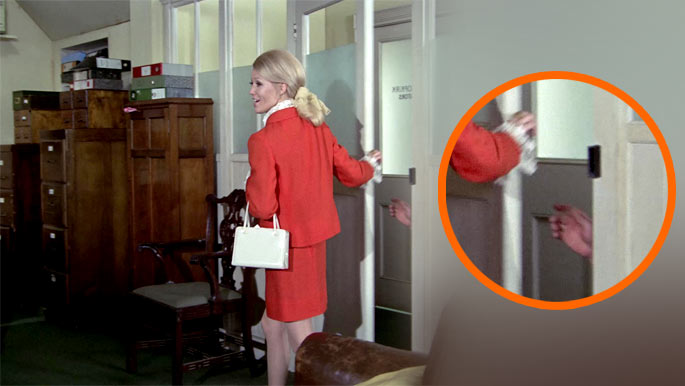
|
Images ©
ITV Studios, 1969 |
|
-
At 17 minutes and 8 seconds,
Bugsy levitates a blue vase in Jean's apartment and
directs it across the room until it is hanging above
Jean's head. Naturally, we excuse the two wires that
are seen to be suspending the vase as technology was
limited in 1969 compared to today, but it is
somewhat unfortunate that the viewer can also see
the cord just below ceiling level along which the
wires are travelling.
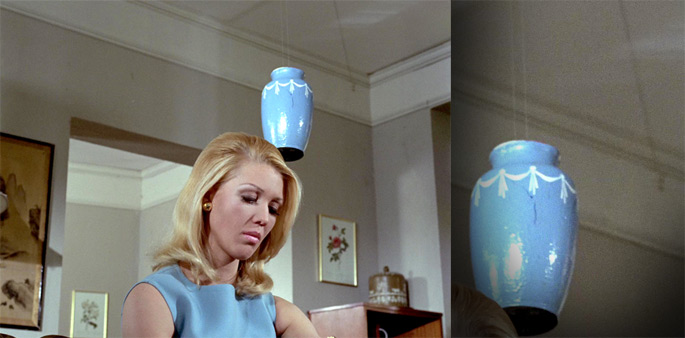
|
Images ©
ITV Studios, 1969 |
|
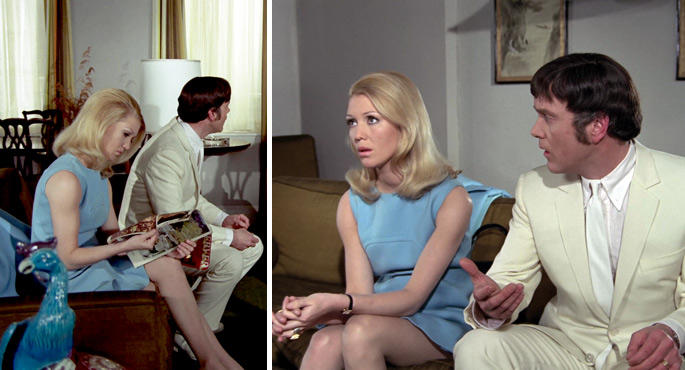
|
Images ©
ITV Studios, 1969 |
|
-
Shortly afterwards, Jeff rings at the doorbell, so
Jean gets up from the sofa to go to the door. In
doing so - and we can forgive this, as what else
could she do? - Annette Andrι visibly goes out of
her way to avoid bumping into her character's
unseen, ghostly husband.
-
When we see the monochrome flashback
to the 1930s at 22 minutes and 26 seconds, the
setting is supposed to be Prohibition era USA, but
both the Ford Model A and the Chrysler Imperial E-80
seen are right-hand drive
versions of these American vehicles made for the
British market.
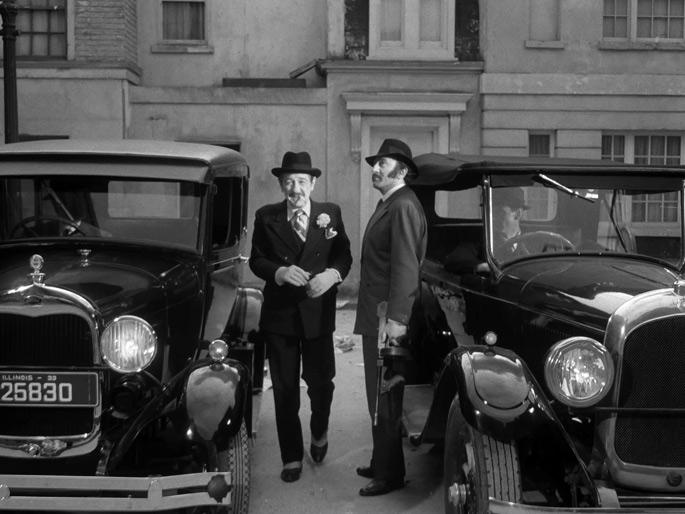
|
Image ©
ITV Studios, 1969 |
|
-
Finally, Jeff's drink problem manifests itself at 30
minutes and 49 seconds - he can't decide which hand
should be holding his whisky! Kirstner hands him his
glass, which he takes in his right hand, lowers and
holds in both hands. Cutting to Jeff's close-up, and
he is now holding the drink higher and in his left
hand. He raises the glass to his mouth, still with
his left hand. At this point, we cut back to the
wider shot from behind him and the glass is at his
lips but now in his right hand again.

|
Images ©
ITV Studios, 1969 |
|
|
|
-
And Finally... The feature location in this
episode was Piggott's Manor as it was called in
1969, situated immediately south west of the centre
of Letchmore Heath. The estate dates back to the
13th century when the land was granted to Thomas
Picot by the Abbot of Westminster, hence becoming
known as 'Picot's Manor'. A Georgian-style manor
house was built there in the early 1700s, and this
endured until 1884 when George Villies purchased and
demolished it. Villies commissioned a larger house
in mock-Tudor style, and it is this building - known
as Piggott's Manor since the 1920s - that survives
today. In 1957, it became the Preliminary Training
College for St Bartholomews nurses, and was sold in
1973 to rock star George Harrison. He gifted the
whole estate to International Society for Krishna
Consciousness (ISKCON), who renamed it Bhaktivedanta
Manor and operate it to this day as a Radha Krishna
temple. It is freely accessible to all and has a
welcoming atmosphere.
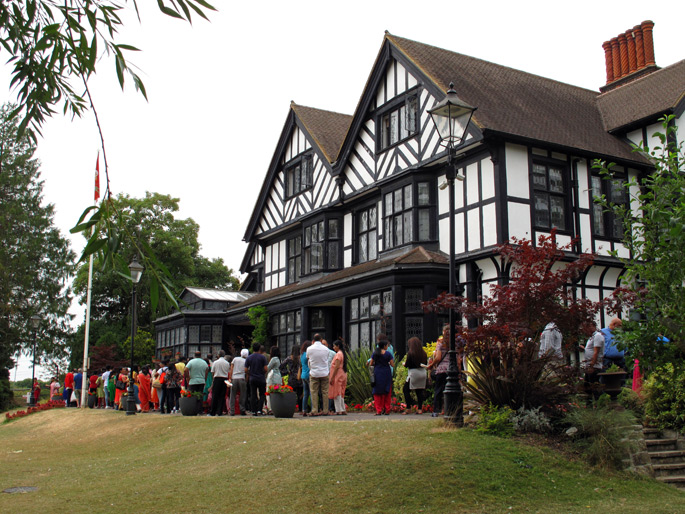 |
|
Image © Alys Hayes, 2018 |
|
|
Plotline: Scoton Productions / ITC UK
Transmissions by Simon Coward and Alan Hayes
Review by Alan Hayes Declassified by
Alan Hayes
with thanks to Vince Cox, Alys Hayes, Annette Hill, John
Holburn,
Anthony McKay and Andrew Pixley
All timings given on this page relate to the Blu-ray editions of this episode |
|
Back to
Programmes Index
Forward to Somebody Just Walked
Over My Grave
Locations: Murder Ain't What It Used To Be!
|
|
|
Back to Top |
|



